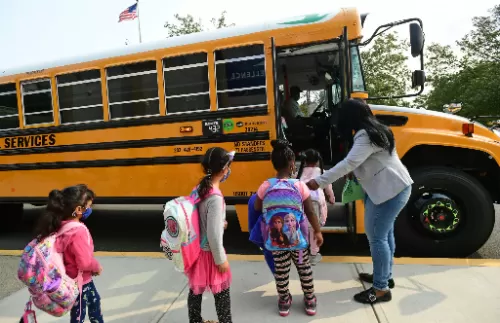
Early Educators Face Growing Strain as Preschool Expansion Stalls

Supporting English Learners in Today’s Classrooms: A Path to Equity and Opportunity

Digital Literacy Lessons for Elementary Students: Teaching Tomorrow’s Skills Today

What Makes Schools Safe: A Holistic Look at Security, Belonging, and Preparedness

Understanding Dyslexia in Special Education: A Guide for Parents and Educators

History Class Can Foster Literacy Skills: A Hidden Power in the Curriculum

How Schools Help Graduates Find Jobs: The Hidden Value of Career Services

Education Department Adds $60 Million in Grants for Charter Schools

Transforming Classrooms: How Educational IT Is Reshaping Learning in America

Closing the Divide: Tackling the Gender Gap in U.S. STEM Education
How Schools Help Graduates Find Jobs: The Hidden Value of Career Services
For many students, the thought of graduation comes with equal parts excitement and anxiety. Walking across the stage may symbolize the end of school, but it also marks the beginning of a new, uncertain chapter: the job hunt. The good news? You don’t have to do it alone. Increasingly, colleges and universities across the U.S. are investing in career development services that go far beyond resume help. From mentorship to employer networking, schools are playing an active role in launching their graduates into the workforce—sometimes before the cap and gown even come off.
Related searches

Career Centers Are More Than Resume Clinics
Most universities now have dedicated career centers, and their role has grown dramatically in the last decade. These are no longer just places where students drop in to print a resume. Today’s career centers offer one-on-one coaching, mock interviews, personality assessments, and access to curated job boards. Many even hold regular workshops on topics like negotiating salaries, navigating LinkedIn, and developing a personal brand. Some centers embed career coaching into the academic curriculum, ensuring students start building their job search toolkit well before graduation day.
Internship Placement as a Pathway to Employment
Internships are no longer optional—they're essential. That’s why many colleges partner with companies and nonprofits to offer students structured internship programs that often lead to full-time positions. Whether it’s a summer internship with a tech firm or a semester-long placement in a public health agency, schools are increasingly serving as bridges between the classroom and the workplace. Career advisors often help students secure internships by refining cover letters, providing alumni referrals, or even creating campus-wide internship fairs to connect students directly with employers.
Alumni Networks Open Real-World Doors
One of the most underrated assets of any college is its alumni network. Schools with strong alumni engagement can be a goldmine for job seekers. From formal mentorship programs to online networking platforms, universities are helping students connect with graduates who have gone on to work in their desired fields. These alumni often provide job leads, informational interviews, and insider insights that give students a leg up in competitive industries. Many schools also host alumni panels and regional networking events to deepen those connections.
Partnering With Employers for Campus Recruiting
Campus recruiting has become a critical component of the college-to-career pipeline. Schools frequently partner with corporations, startups, and government agencies to bring recruiters directly to campus. Career fairs, info sessions, and even on-campus interviews give students early exposure to potential employers. In some cases, companies establish long-term partnerships with schools, offering exclusive hiring tracks for graduates. These programs are especially popular in business, engineering, and computer science fields where demand for skilled graduates is high.
Equipping Students With Industry-Specific Tools
Recognizing that every field is different, many career centers tailor their services to specific industries. A student pursuing a degree in education, for example, might get training in how to navigate teacher hiring fairs, while someone in the creative arts may get portfolio reviews and freelance contract advice. Some schools even offer micro-credentialing or certificate programs in areas like project management or data analytics, giving students an extra edge in the job market. These targeted efforts help graduates hit the ground running in their chosen industries.
Job Market Data and Career Pathway Mapping
Today’s career centers don’t just give advice—they offer data. Many schools now use labor market tools to track job placement rates, average starting salaries, and regional employment trends. This data helps students make informed decisions about which industries to pursue and which cities might offer better job prospects. Some schools also offer career pathway mapping, where students receive visual guides showing how to move from entry-level roles to leadership positions in their field of interest.
A Career-Focused Education is a Competitive Advantage
As the job market grows more competitive, students need more than a diploma to succeed—they need guidance, experience, and connections. Schools that recognize this are turning education into a launchpad, not just a learning experience. From internship programs and alumni support to employer partnerships and real-world training, colleges and universities are stepping up to ensure their graduates don’t just earn degrees—they land jobs. For prospective students and parents alike, this career support should be a top factor when choosing a school. After all, the real value of higher education lies not just in what you learn, but in where it takes you.
 By: Erin Lin
By: Erin Lin

